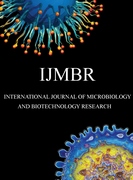Volume 1, Issue 1, 2014

Mcmed International
International Journal of Microbiology and Biotechnology Research
Issn
XXX-XXXX (Print),
XXXX-XXXX (Online)
Frequency
bi-annual
Email
editorijmbr@mcmed.us












